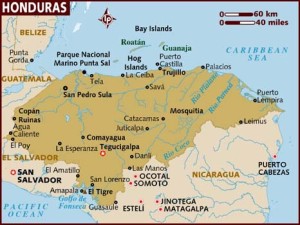By: Shahab Moghadam
The United States military has long been known to engage itself in questionable conflicts in various parts of the world, however, a lengthy TPS investigation revealed that, in a major deviation from the Obama Administration’s oft-repeated commitment to adhere to certain core principles in pursuing foreign policy objectives, the U.S. military began actively stationing soldiers at the Soto Cano Air Base in Honduras in mid-2009, shortly after a coup removed the nationalist President of that nation and replaced him with a military junta which came to power under mysterious circumstances.
Ever since the coup took place in 2009, Honduran-American relations have been at the highest point in decades, with American forces engaged in risky counternarcotics operations with the support of the Honduran military which have often resulted in civilian casualties, while Honduran civilians are reportedly subject to arbitrary arrest and brutal torture at the hands of the civilian government which took power after the military junta stepped down voluntarily. Ousted President Manuel Zelaya returned from exile a few years after he fled the country and has since come to terms with the new leadership of his country, while the Obama Administration acknowledges the status quo on the ground after initially urging a reversal of the coup and even uses the new situation to its benefit, as seen by the rapid influx of soldiers and DEA agents into the country within months of the coup.
This is not the first time that American forces have acted with relative impunity in Honduras, as the United States military engaged in operations throughout Central America and the Caribbean throughout the late 19th and early-to-mid 20th centuries, a history of intervention which led many civilians to seek redress under the Communist banner of leaders such as Fidel Castro in Cuba and, much later, Daniel Ortega in Nicaragua. However, for the United States military to be actively engaged in secretive yet extensive operations relating to a federal drug policy which recent polls show a vast majority of Americans disapproving of in a sovereign foreign nation without the awareness or approval of the citizens or elected representatives of either country is a situation which flies in the face of all that President Obama and his Administration have stated in regards to responsible leadership abroad using principles of openness which were largely missing during the George W. Bush Administration. Repeated inquiries directed by TPS to a number of federal government agencies were rejected on procedural grounds, leading TPS reporters to scour the Internet for any previously-released information on this massive shadow war in Central America.
What we found shocked us and further deepened our understanding of what has been a black mark on an otherwise largely consistent policy of responsible global leadership. From shootings of unarmed fishing boats carrying pregnant women to operations leading to the deaths of young children, the United States military and its allies in the autocratic Honduran military have played a risky game with the fate of an entire nation in the name of counternarcotics efforts. Fanning the flames of discontent among disgruntled Hondurans, the U.S. State Department has repeatedly refused to even investigate claims of misconduct by American officials and military personnel in Honduras, even after a woman who was shot in the leg by American forces while navigating a fishing boat with a number of pregnant women and ordinary fishermen came out of the woodwork to share her story.
The U.S. military is joined in Honduras by the Drug Enforcement Agency and a litany of diplomatic officials, all working in concert with Honduran authorities to reduce Honduras’ crime rate, which is the region’s highest as well as to undermine the drug smuggling operations which have proven so rampant in Central America in the past and which some claim are making a rebound as Mexican officials crack down like never before on drug cartels and their allies.
There is no doubt that the United States military and its counterparts in the State Department began with at least partly noble intentions in building military bases in Honduras and providing monetary support to counternarcotics efforts by the Honduran military, however, as is often the case when boots are put on the ground in large quantities accompanied by millions of dollars in government funds, initial good intentions are lost in a sea of botched operations and unnecessary risks. By 2012, California Congressman Howard Berman joined human rights organizations both in the United States and in Honduras in calling for more oversight and accountability, in effect asking for the spotlight to be shined on a shadow war which, if properly adjusted, can still be made into a positive operation carried out with all the values which the United States proudly stands by.

